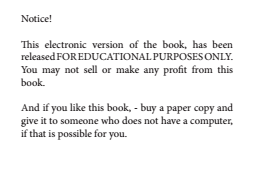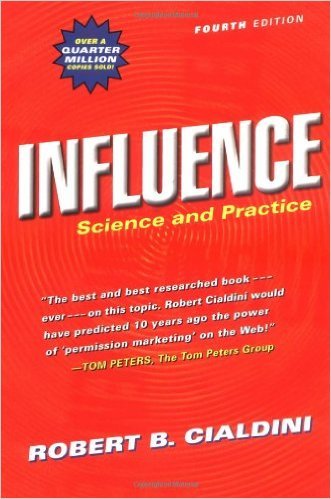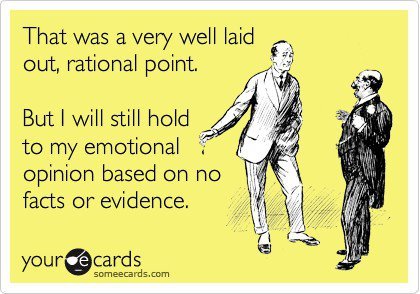Can you resist Persuasion Tactics? You shouldn't read this (but probably will anyways...) Part 1 of 2
You have authority issues.
The psychological term for it is reactance.
> “Reactance occurs when a person feels that someone or something is taking away his or her choices or limiting the range of alternatives.”
That is why you don't like being told what to do and usually do the opposite.
I wasn’t going to post this today because I know your time is too limited.
In fact, this Persuasion Series, as described in the introduction article Raise Your Steem Power Through Persuasion, is based on your limitations of time.
You could read all these books yourself, but by up voting my articles you are outsourcing the hard part and getting all the good stuff filtered directly to you.
You came back, which means you have an eye for value.
So let us get on with it.
Houdini? No, Cialdini
Harry Houdini was an American illusionist, but today we are talking about Cialdini, specifically Robert B. Cialdini.
The lessons we learned from illusions last time are that things are not always the way they first appear to be. This matters in persuasion because opening our minds to alternative perspectives allows us to visualize a situation different than what we currently believe the world has to be like.
Notice Disclaimer: The images of the text and quotes are being used for educational purposes Mainly that of educating you on the benefits of using persuasion in your writing in the #steemitcommunity.

With that being said, I enjoyed this book immensely and recommend it if you have the time
Influence: Science and Practice Fourth Edition by Robert B. Cialdini
Quick Facts:
- 250 pages
- Textbook Style
- Examination of “Weapons of Influence” and How to Resist Persuasion Techniques
- 8 Chapters covering:
- Weapons of Influence
- Reciprocation
- Commitment and Consistency
- Social Proof
- Liking
- Authority
- Scarcity
- Instant Influence
Why read each section?
The book has numerous examples of each “weapon of influence” as described in the first chapter. However, usually just one example is good enough to understand the concept.
I will provide the basic gist to save your time
Also for readability sake I have divided this into 2 post.
Part 1 will cover Chapters 1 - 4.
Part 2 covers Chapter 5 - 8.
Weapons of Influence
This introductory chapter reminds us that we are not as rational as we think we are.
You can disagree but when you examine the actions you take daily, you notice that there are too many things to do to think things out thoroughly and so instead you fall back on “short-cuts” in thinking to get you through the day.
Example:
> “A well-known principle of human behavior says that when we ask someone to do us a favor we will be more successful if we provide a reason.”
> “People simply like to have reasons for what they do. Langer demonstrated this unsurprising fact by asking a small favor of people waiting in line to use a library copying machine: "Excuse me, I have
five pages. May I use the Xerox machine because I'm in a rush?"”
> “The effectiveness of this request plus-reason was nearly total: 94 percent of those asked let her skip ahead of them in line. Compare this success rate to the results when she made the request only: "Excuse me, I have five pages. May I use the Xerox machine?" Under those circumstances only 60 percent of those asked complied. At first glance, it appears that the crucial difference between the two requests was the additional information provided by the words because I'm in a rush. However, a third type of request tried by Langer showed that this was not the case.”
> “It seems that it was not the whole series of words, but the first one, because, that made the difference. Instead of including a real reason for compliance, Langer's third type of request used the word because and then, adding nothing new, merely restated the obvious: "Excuse me, I have five pages. May I use the Xerox machine because I have to make some copies?" The result was that once again nearly all (93 percent) agreed, even though no real reason, no new information was added to justify their compliance.”
> “…so the word because triggered an automatic compliance response from Langer's subjects, even when they were given no subsequent reason to comply.” Influence, p. 4
These automatic responses happen more than you would believe. And so the following chapters get into some of the situations that prompt these responses and how you can deal with it to resist the persuasion tactics.
Or use them to be influential on #steemit and gain more Steem Power
So can I get an up vote, because pizza is a food?
Reciprocation
Reciprocation simple means returning a favor.
Numerous examples are given showing how once you do something or give something to someone; there is a strong psychological response to do something for you in return.
The weird thing is that it can be something that seems totally unrelated. A small gift, even if you don’t value it, can cause you to do something in return. The most known example, which Cialdini brings up is that of the Hare Krishna Society who would give out flowers and get donations in return.
A second way to use reciprocity rule
> “It is more subtle than the direct route of providing that person with a favor and then asking for one in return, yet in some ways it is much more effective.”
> “A personal experience I had a few years ago gave me firsthand evidence of just how well this compliance technique works.”
> “I was walking down the street when I was approached by an 11- or 12-year-old boy. He introduced himself and said he was selling tickets to the annual Boy Scouts Circus to be held on the upcoming Saturday night. He asked if I wished to buy any tickets at $5 apiece. Since one of the last places I wanted to spend Saturday evening was with the Boy Scouts, I declined. "Well," he said, if you don't want to buy any tickets, how about buying some of our chocolate bars? They're only $1 each."”
> “I bought a couple and, right away, realized that something noteworthy had happened. I knew that to be the case because (a) I do not like chocolate bars; (b) I do like dollars; (c) I was standing there with two of his chocolate bars; and (d) he was walking away with two of my dollars.”
> “His request that I purchase some $1 chocolate bars had been put in the form of a concession on his part; it was presented as a retreat from his request that I buy some $5 tickets. If I were to live up to the dictates of the reciprocation rule, there had to be a concession on my part. As we have seen, there was such a concession: I changed from noncompliant to compliant when he moved from a larger to a smaller request, even though I was not really interested in either of the things he offered.” Influence, p. 36-37
If you are looking to avoid being persuaded by reciprocation, Cialdini suggests:
> “The real opponent is the rule. If we are not to be abused by it, we must take steps to defuse its energy.” Influence, p. 47
> “Merely define whatever you have received… not as gifts but as sales devices and you will be free to decline (or accept) the purchase offer…” Influence, p. 49
If you up vote this and leave a reply, then I will be able to read your articles and then return the favor, because come on...
Commitment and Consistency
> “To understand why consistency is so powerful a motive, we should recognize that, in most circumstances, consistency is valued and adaptive. Inconsistency is commonly thought to be an undesirable personality trait (Allgeier, Byrne, Brooks, & Revnes, 1979; Asch, 1946). The person whose beliefs, words, and deeds don't match is seen as confused, two-faced, even mentally ill. On the other side, a high degree of consistency is normally associated with personal and intellectual strength. It is the heart of logic, rationality, stability, and honesty.” Influence, p. 54
> “Since it is so typically in our best interests to be consistent, we fall into the habit of being automatically consistent even in situations where it is not the sensible way to be. When it occurs unthinkingly, consistency can be disastrous.” Influence, p. 55
Changes are that you have been caught up in a situation where you said one thing and later didn’t want to do it, but you did it anyways to stay consistent.
One time when I was on a date we went to a local coffee shop. Normally I just drink regular coffee. However, this time I ordered a shot of espresso. Not being used to the order, the barista helpfully suggested that it be served with a shot of whipped cream. I don’t like whipped cream and so I declined.
Now the barista pushed back because they didn’t want me to have a bad experience of drinking straight espresso. “Are you sure you don’t want the cream?” they asked.
I was on a date. I said “no”. I was not going to back down and look foolish.
I was committed and consistent, even though I found out sipping straight espresso is gross.
Most people like to keep their word.
Or at least their illusions of sanity.
To be persuasive you can create situations where people will want to remain consistent with what they have committed to.
To defend against this tactic:
> “The only effective defense I know against the weapons of influence embodied in the combined principles of commitment and consistency is an awareness that, although consistency is generally good, even vital, there is a foolish, rigid variety to be shunned. We must be wary of the tendency to be automatically and unthinkingly consistent, for it lays us open to the maneuvers of those who want to exploit the mechanical commitment-consistency sequence for profit.” Influence, p. 90
Have you read this far? Will you up vote my article, because you don’t want to feel like your commitment is a waste of time?
Social Proof
> “The principle of social proof states that we determine what is correct by finding out what other people think is correct. The principle applies especially to the way we decide what constitutes correct behavior. Influence, p. 100
This is why @biophil was correct is asking: “Is Steem paying for Groupthink?”.
Although we don’t have to do what other people do, we are influenced by it as a correct action. Especially here on #steemit where The Steem Whitepaper explains curation incentives as such:
> “A single vote provides little curation value, but billions of votes is very effective curation. Content without curation is of limited value.” p.39
And here:
> “By incentivizing curation the Steem network is able to use automated algorithms to extract the most valuable information from a massive amount of content.” p.41
The more votes an article gets, the more likely you are to vote for it to be “correct” and earn a curation reward.
That’s social proof.
The suggested resistance to this auto-response is given on page 134 of the book Influence:
> “Fortunately, there is a way out of the dilemma. Because the disadvantages of automatic pilots arise principally when incorrect data have been put into the control system, our best defense against these disadvantages is to recognize when the data are in error. If we can become sensitive to situations in which the social proof automatic pilot is working with inaccurate information, we can disengage the mechanism and grasp the controls when we need to.”
More people will up vote this article, if more people up vote this article. Will you?
Check back for more on this series on #persuasion
Because you never know who you are going to meet…
@strangerarray
The guide:
*Introduction to Persuasion Series
*First Flight: Imagination and Persuasion
*Illusions: The Adventures of a Reluctant Messiah
*Influence by Robert B. Cialdini -- Part 1
*Influence -- Part 2: Resistance to Persuasion is Futile. Part 2 of 2
*Coming Soon…. How to Fail at Almost Everything and Still Win Big by Scott Adams




Is this from one of your books?
Nope. This is exclusive original content for #steemit.
But maybe I will put it into one in the future...
Still reading... LONG POST.... but already enjoying it quite a bit. Informative, well put together, entertaining, and possibly important. (not done yet)
EDIT: I up voted and voted early just BECAUSE.
EDIT 2: Was my commitment a waste of time?
EDIT 3: No one else has up voted this article. Will they because I did?
The edits are my proof that I did read it and finish it. Good read, thanks. I hope you get more up votes.
Thank you @dwinblood. Your early vote may not earn you a higher curation, but it has gained you a follower (me). And yes I know that the follow function doesn't work yet, but I have a list of steemians I check.
I'm weird. I vote on what I like. :) I often don't like what others like. I hope I am wrong in this case.
I think you would love the book The Art of Seduction by Robert Greene, if you haven't already read it. This post was smart and hilarious with fascinating links. Following!
It's kind of ridiculous that Hilary didn't get indicted